Traditional marriage is extremely important in Igbo culture as it signifies the formal union of a couple and the merging of their families. It is a celebration that honors ancestral customs and reinforces community bonds. This ceremony is not just about the couple; it involves the families and the community, highlighting the collective support and shared values that are central to Igbo life.
Moreover, traditional marriage serves as a rite of passage for the couple, marking their transition into adulthood and responsibility. It is a time for celebration, showcasing cultural heritage through music, dance, and, importantly, the traditional attire that reflects identity and pride. Overall, traditional marriage is a vital aspect of Igbo culture, emphasizing unity, respect, and the continuity of traditions.
Attire plays a pivotal role in traditional marriage, particularly in Igbo culture, as it embodies the essence of the celebration and carries deep cultural significance. Each garment worn by the bride and groom is carefully chosen to reflect their identity, family heritage, and social status. Attire in traditional marriage is not just about aesthetics; it is a powerful expression of cultural identity, respect for tradition, and the celebration of love and community.
The groom’s attire in Igbo traditional marriage plays a significant role in the ceremony. The groom typically wears a traditional outfit known as “isi agu” or “isi ohu,” which is made from beautifully patterned fabric, often in vibrant colors, showcasing the culture and identity of the Igbo people. This attire is usually complemented by accessories such as a cap (often called “okpu agu”) and tailored trousers or wrappers. The overall look is designed to reflect elegance and cultural pride. The groom’s outfit often symbolizes love and respect, making the occasion special and memorable. The attire serves as a connection between the couple and their cultural heritage, reinforcing the importance of tradition in the lives of the Igbo people. Ultimately, the groom’s attire is not just clothing; it is a representation of the rich customs and values of the Igbo culture during the marriage ceremony.
Isi Agu is a traditional garment worn by men in Igbo culture, renowned for its distinctive design and cultural significance. The garment is typically made from richly patterned fabric, often featuring bold colors and intricate motifs that reflect the wearer’s status and heritage.
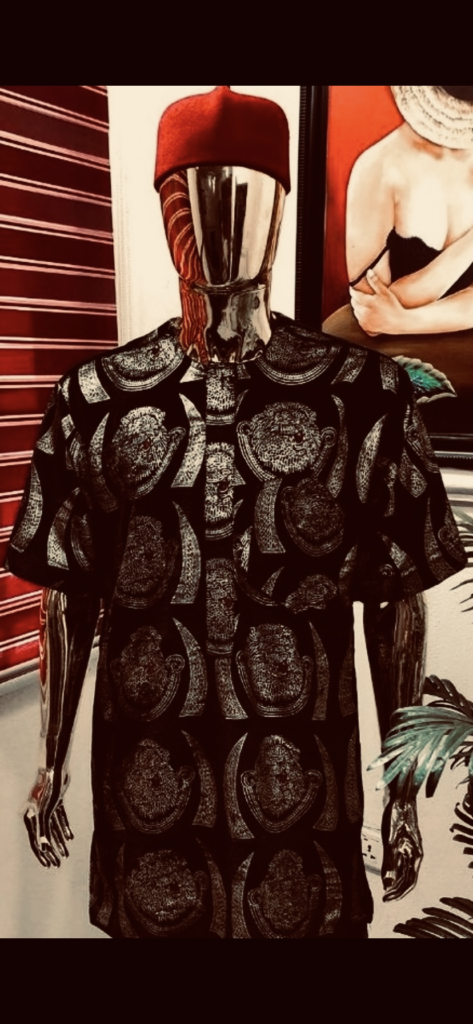
Isi Agu
Historically, the Isi Agu garment has been associated with warriors and nobility, symbolizing strength, bravery, and leadership within the community. It is often worn during important cultural events, such as traditional marriages, festivals, and ceremonies, where it serves to honor ancestral customs and showcase the wearer’s pride in their heritage.
In the context of traditional marriage, the Isi Agu is particularly important as it represents the groom’s commitment to uphold his family’s honor and traditions. The garment’s vibrant patterns and colors also signify joy and celebration, making it a fitting choice for such a significant occasion. Overall, the Isi Agu is not just a piece of clothing; it is a powerful emblem of Igbo identity and cultural pride.
The red cap, known as “okpu agu” in Igbo culture, carries significant symbolism. It is traditionally worn by titled men, especially during important ceremonies and gatherings. Here are some key symbols associated with the red cap:
Status and Title: The red cap signifies that the wearer has attained a certain level of respect and recognition within the community. It is often associated with men who have been honored with titles, indicating their leadership and contributions.
Authority and Leadership: Wearing the red cap symbolizes authority and leadership. It represents the responsibility that comes with being a respected member of the community, often seen as a role model for others.
Cultural Heritage: The red cap is a representation of Igbo identity and cultural heritage. It embodies the values, traditions, and customs of the Igbo people, serving as a reminder of their rich history.
Unity and Brotherhood: In gatherings, the red cap can also symbolize unity among titled men, reinforcing the bonds of brotherhood and shared responsibilities within the community.
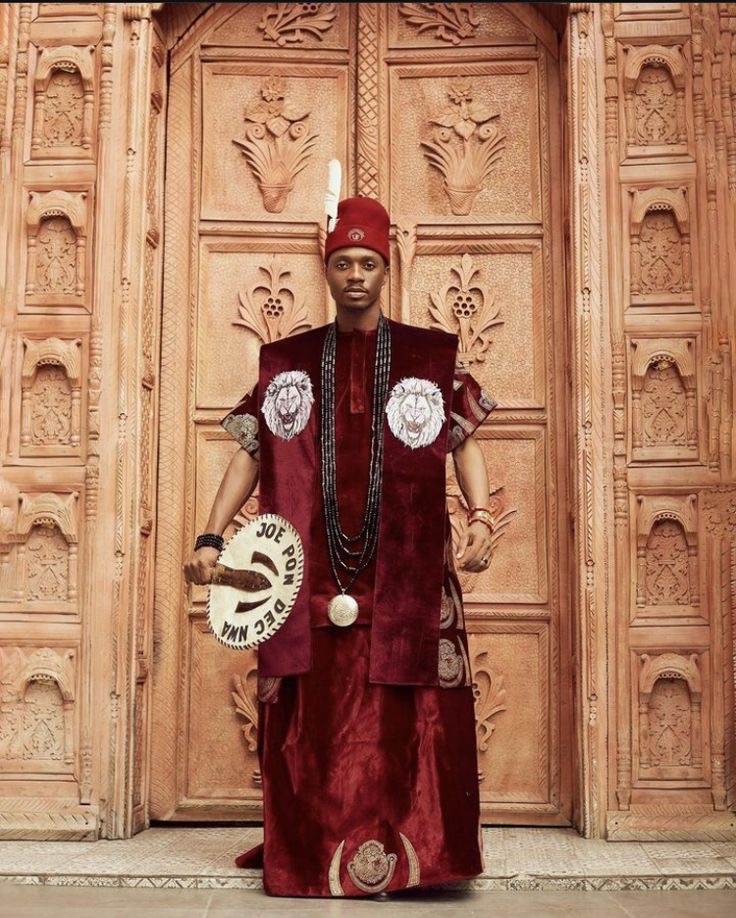
An Igbo man attire.
The okpu agu is not just a fashion statement but a powerful symbol of respect, authority, and cultural pride in Igbo society.
In Igbo culture, the staff, often referred to as “udu,” holds significant meaning and is an important symbol in various contexts. Here are some key aspects of the staff in Igbo tradition:
Symbol of Authority: The staff is commonly associated with leadership and authority. It is often carried by chiefs, elders, and titled men during ceremonies and important gatherings, signifying their status and role within the community.
Cultural Significance: The staff is used in many traditional rituals and ceremonies, representing the connection between the physical and spiritual realms. It can also embody the wisdom and strength of the ancestors, serving as a reminder of cultural heritage.
Ceremonial Use: During events such as weddings, funerals, and festivals, the staff may be used as a prop to enhance the ceremonial proceedings. It adds a level of formality and respect to the occasion.
Artistic Expression: Many staffs are intricately carved and designed, showcasing the artistry and craftsmanship of the Igbo people. These designs often tell stories or represent important symbols in Igbo culture.
Unity and Support: The staff can also symbolize unity among community members, as it is often used in collective gatherings. It serves as a physical representation of the support and strength that comes from the community. The staff is a powerful symbol in Igbo culture, representing authority, tradition, and the rich heritage of the Igbo people.
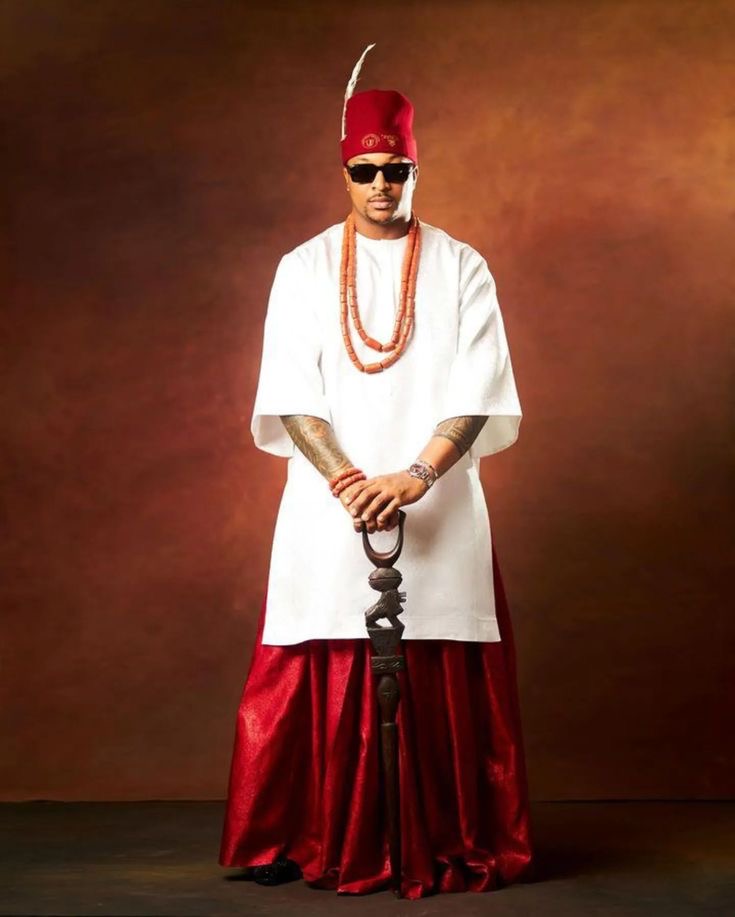
An Igbo groom
During a traditional marriage ceremony, a bride typically changes into several outfits, each representing different aspects of her culture and the significance of the event.
Initial Outfit: This is the first outfit worn by the bride, symbolizing tradition and beauty. It often includes a wrapper and a blouse made from vibrant fabrics.
Second Outfit: After the initial ceremony, the bride may change into a traditional wrapper and blouse, showcasing the richness and depth of the culture.
Third Outfit: This outfit is typically worn for evening celebrations and is often referred to as “Okwu Nwunye.” It creates a special atmosphere for the night festivities.
Final Outfit: Lastly, the bride may wear an outfit for the gathering, known as “Ndị Nwunye,” which adds a unique touch to the overall celebration.
These outfit changes highlight tradition and elegance, making the ceremony a memorable occasion.
In Igbo tradition, a bride’s outfits are rich in symbolism and cultural significance. Here’s an exploration of some common bridal outfits and their meanings:
Always Ocha (White Attire): The bride often wears a white dress during the wedding ceremony. This attire symbolizes purity, peace, and new beginnings. It reflects the bride’s intention to enter marriage with a clean slate, fostering harmony in her new life.
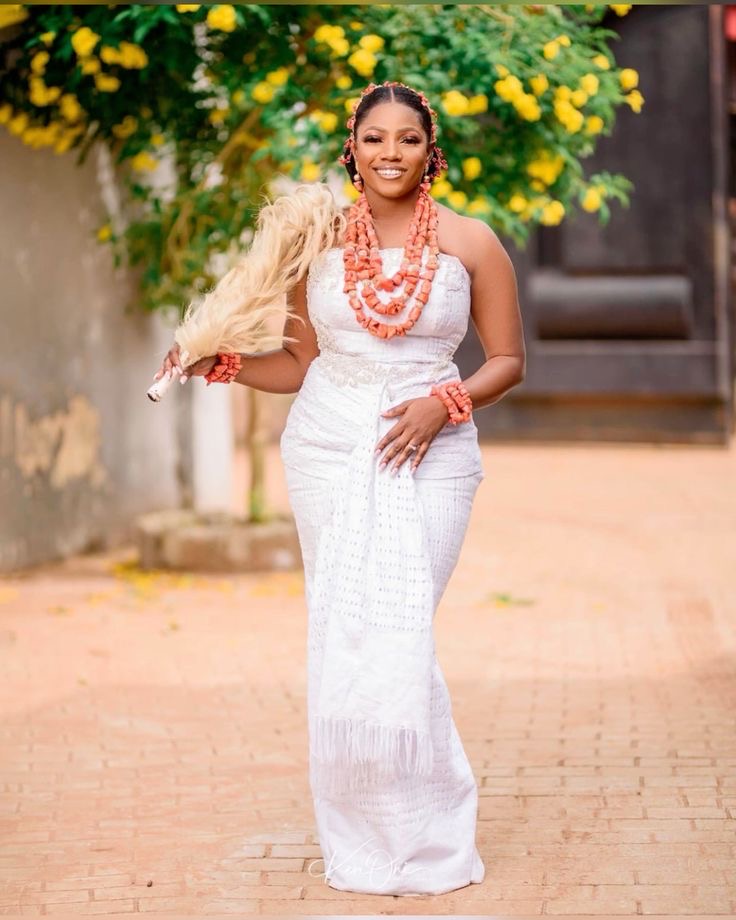
An Igbo bride in akwa ocha
Akwete Fabric: Akwete is a traditional handwoven fabric known for its vibrant colors and intricate patterns. Wearing Akwete signifies a deep connection to Igbo heritage and culture. It represents the bride’s pride in her roots and her commitment to preserving her identity and traditions.
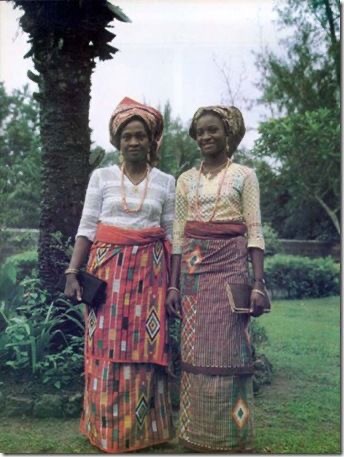
Women in akwaete (2001).
Color Symbolism: The colors chosen for the bridal outfit carry specific meanings. For instance, red is often associated with love and passion, while green represents fertility and prosperity. White denotes purity and peace, creating a harmonious atmosphere for the marriage.
Accessories: Accessories play a crucial role in completing the bridal look. Items like coral beads, traditional earrings, and headpieces not only enhance the bride’s beauty but also signify her cultural heritage. Each accessory can carry its own meaning, representing wealth, status, and the blessings of ancestors.
George & Agbada (Ikwu Nne): In some ceremonies, brides may also wear a traditional wrapper known as “Ikwu Nne.” It features vibrant colours and intricate designs. This outfit symbolizes the connection to maternal lineage and honors the bride’s family. It reflects the importance of family ties and the role of women in maintaining cultural practices.
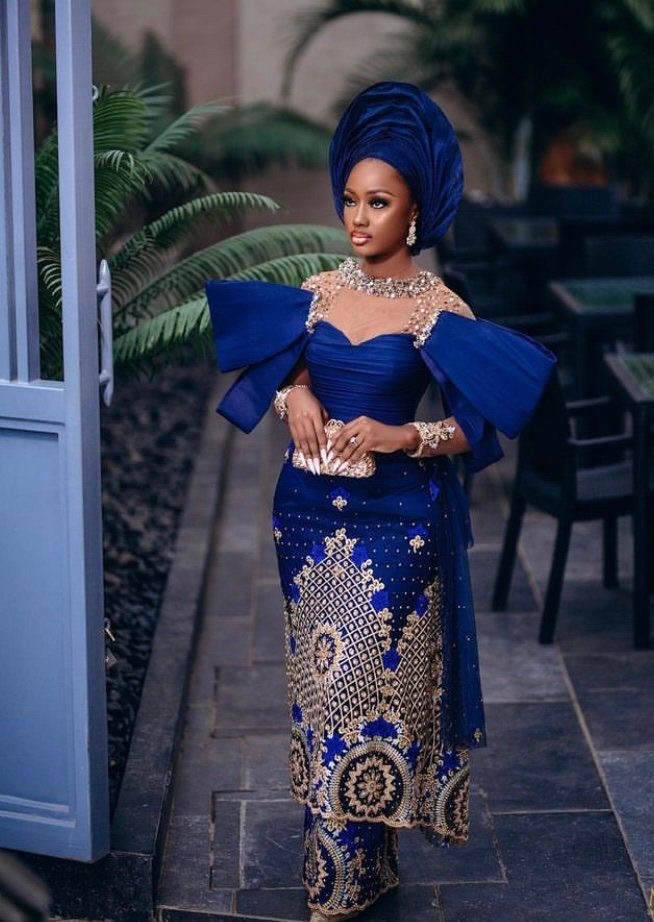
An Igbo bride dressed in George.
Overall, the outfits worn by an Igbo bride during her wedding are not just for aesthetic purposes; they embody deep cultural meanings and reflect the values, beliefs, and traditions of the Igbo people.
Modernization has significantly influenced Igbo bride attire, particularly with the introduction of lace materials. Traditionally, brides wore handwoven fabrics like Akwete, but today, lace has become increasingly popular for several reasons. It offer a variety of styles and designs that can be tailored to modern tastes while still honoring cultural elements. Many brides now incorporate lace into their outfits, blending it with traditional fabrics to create stunning combinations that reflect both modern fashion and Igbo heritage. This fusion allows brides to express their individuality while still showcasing their cultural roots.
Additionally, lace is often associated with elegance and sophistication, making it a favored choice for contemporary weddings. The intricate patterns and textures of lace can enhance the overall look of a bridal gown, adding a touch of glamour that appeals to many modern brides. The versatility of lace enables brides to experiment with different silhouettes, from fitted gowns to flowing skirts, allowing for personal expression in their bridal looks. This modernization also extends to accessories, where lace elements can be incorporated into veils, sashes, and even shoes, creating a cohesive and stylish appearance.
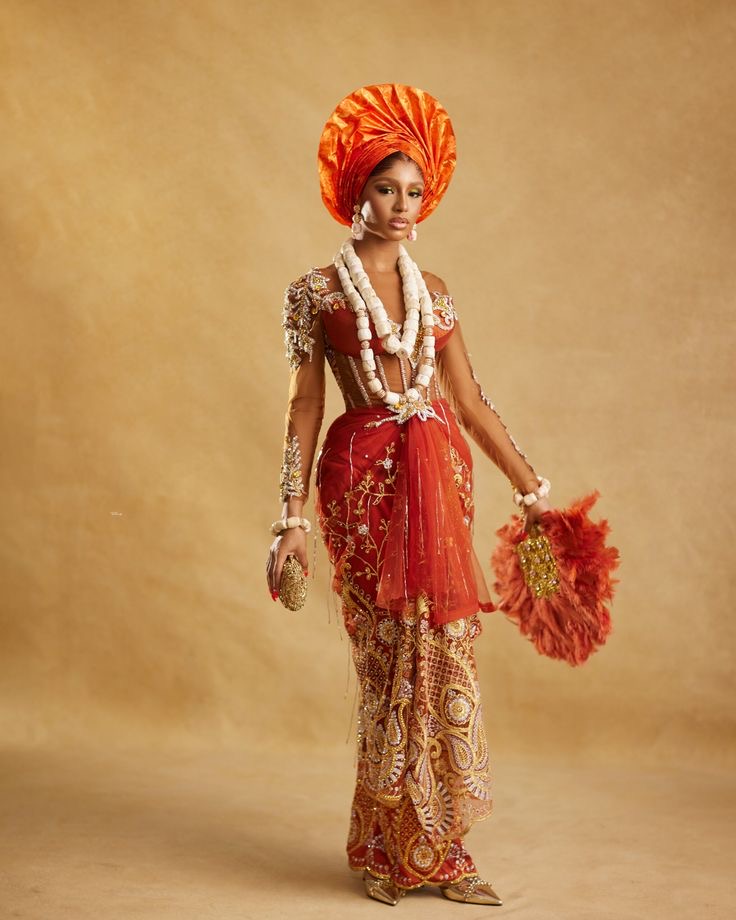
An Igbo bride in lace
The use of lace materials in Igbo bridal attire represents a beautiful blend of tradition and modernity, allowing brides to celebrate their cultural identity while embracing contemporary fashion trends. This evolution continues to enrich the narrative of Igbo weddings, making them vibrant and reflective of both past and present.
Overall, the igbo traditional marriage attire is not just about fashion; it represents the couple’s identity, family heritage, and the significance of the marriage ceremony in Igbo culture.

Okay, this is so good.